Overview:
Understanding alcohol consumption with diabetes is crucial as it can initially raise blood sugar levels but may also lead to hypoglycemia, especially when consumed without food. The article emphasizes the importance of moderation and careful monitoring of blood sugar levels, outlining guidelines and potential risks associated with alcohol intake for individuals managing diabetes, thus providing a comprehensive framework for safe drinking practices.
Introduction
Navigating the complexities of alcohol consumption can be particularly challenging for individuals managing diabetes. The relationship between alcohol and blood sugar levels is multifaceted, with potential benefits and risks that must be carefully weighed.
While moderate alcohol intake may offer some advantages, excessive consumption poses significant dangers, including hypoglycemia and interactions with diabetes medications. This article delves into the intricate dynamics of alcohol's effects on diabetes, offering essential guidelines, safe drinking practices, and strategies for monitoring blood sugar levels.
By understanding these factors, individuals can make informed decisions that support their health and well-being while enjoying social occasions.
The Relationship Between Alcohol and Diabetes: Understanding the Basics
Alcohol consumption with diabetes can affect sugar levels through various mechanisms. It can initially raise blood sugar because of its carbohydrate content, a factor that is especially significant for individuals managing alcohol consumption with diabetes. However, excessive alcohol consumption with diabetes poses the risk of hypoglycemia, especially when ingested without accompanying food.
This dual effect necessitates a nuanced understanding for the effective management of blood sugar levels, especially regarding alcohol consumption with diabetes. Moreover, alcohol consumption with diabetes can disrupt blood sugar medications, including insulin and specific oral hypoglycemic agents, complicating glucose regulation. Recent research shows an unadjusted standardized mean difference (SMD) for insulin sensitivity index (ISI) and HOMA-IR of 0.08 (p = 0.35), indicating that the effects of beverages on insulin sensitivity may vary.
Dolly O Baliunas points out, 'Because previous drinkers may be motivated to refrain from alcohol consumption with diabetes due to health issues, they may actually face a heightened risk of developing diabetes-related conditions,' emphasizing the possible dangers linked to beverage intake. Furthermore, a case study named 'Zheng 2012' investigated how beverage intake influenced insulin and glucose levels in a randomized study with healthy individuals, further illustrating the intricacies of alcohol's effect on managing blood sugar. As a result, it is essential for individuals with diabetes to closely observe their body's reactions to ethanol and to incorporate this understanding of alcohol consumption with diabetes into their overall management strategy.
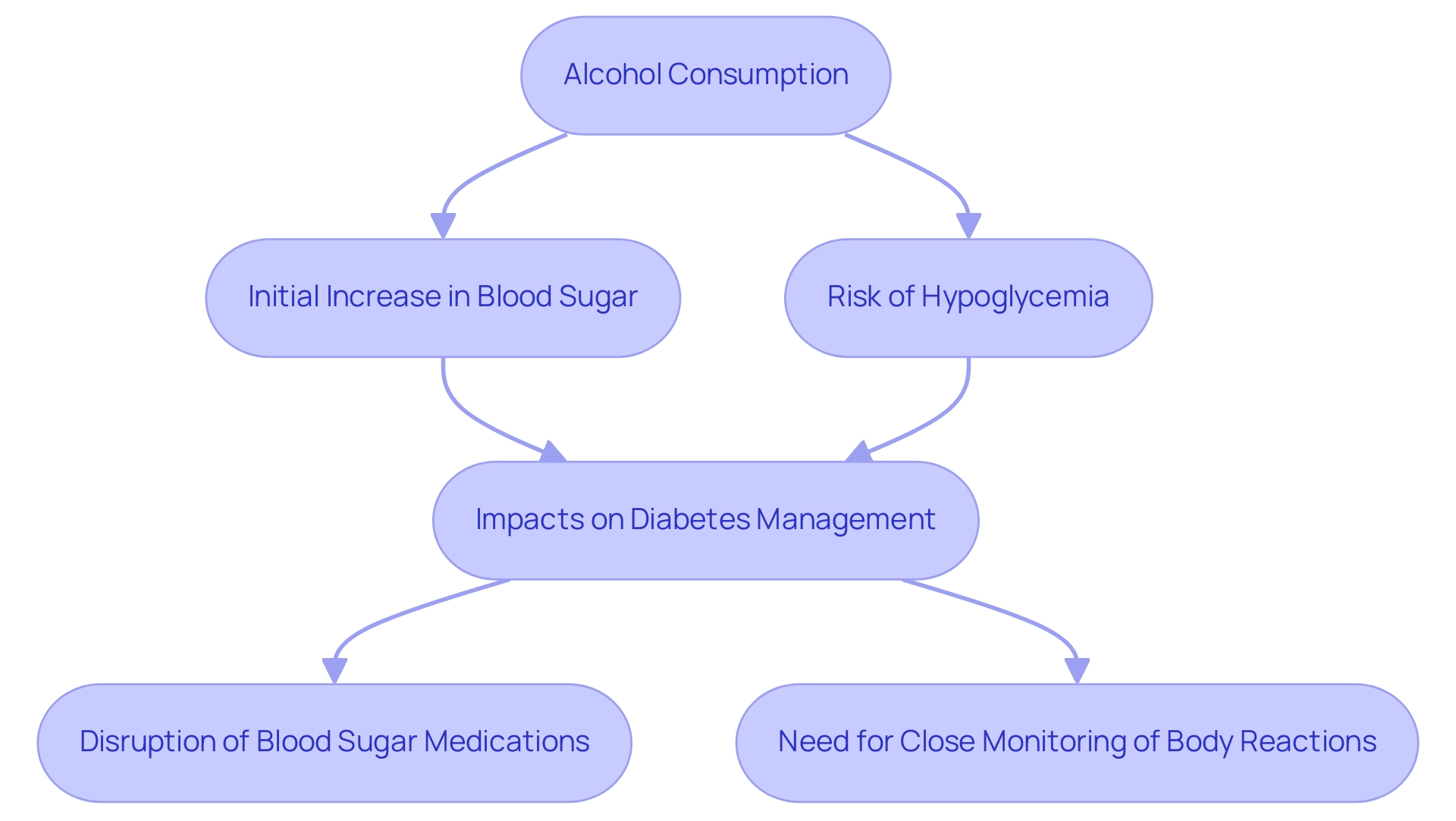
Safe Drinking Guidelines for People with Diabetes: Tips and Best Practices
At T 2 Solutions, we recognize the difficulties newly diagnosed individuals encounter, particularly regarding managing alcohol consumption with diabetes alongside blood sugar management. Here are some essential guidelines to consider:
-
It is vital to discuss alcohol consumption with diabetes with your healthcare provider before consuming beverages, especially if you are taking medications for blood sugar control.
This step ensures that your treatment plan remains effective and safe. -
Limit alcohol consumption with diabetes to moderate levels, which is generally defined as up to one drink per day for women and up to two for men.
Studies indicate that alcohol consumption with diabetes, when moderate, is linked to a 30% decreased risk of diabetes among both men (RR 0.72 [95% CI 0.67–0.77]) and women (RR 0.68 [95% CI 0.61–0.75]), highlighting the significance of moderation in managing diabetes. -
To manage alcohol consumption with diabetes, avoid consuming spirits on an empty stomach and always combine it with food to assist in stabilizing sugar levels and reduce fluctuations.
This practice can avert sudden decreases in glucose that may happen with beverage intake. -
Opt for low-carb or sugar-free mixers to minimize carbohydrate intake.
This choice helps in managing overall carbohydrate consumption, which is crucial for maintaining balanced blood glucose levels. -
To stay hydrated, it's important to manage alcohol consumption with diabetes by alternating alcoholic beverages with water.
This not only assists in controlling your drinking pace but also reduces the dehydrating effects of spirits, which can complicate alcohol consumption with diabetes and blood sugar management.
Furthermore, be aware of the 'sick-quitter effect,' as noted by Dolly O Baliunas, where former drinkers may be at increased risk of developing health issues due to health concerns.
Furthermore, studies, including the case analysis named 'Biological Mechanisms of Alcohol Use and Related Risks,' underscore possible biological processes that might clarify the U-shaped connection between beverage intake and health risks, stressing the importance of moderation.
For additional resources and assistance, stay tuned to T2D Solutions, where we will offer further guidance on managing this condition effectively.
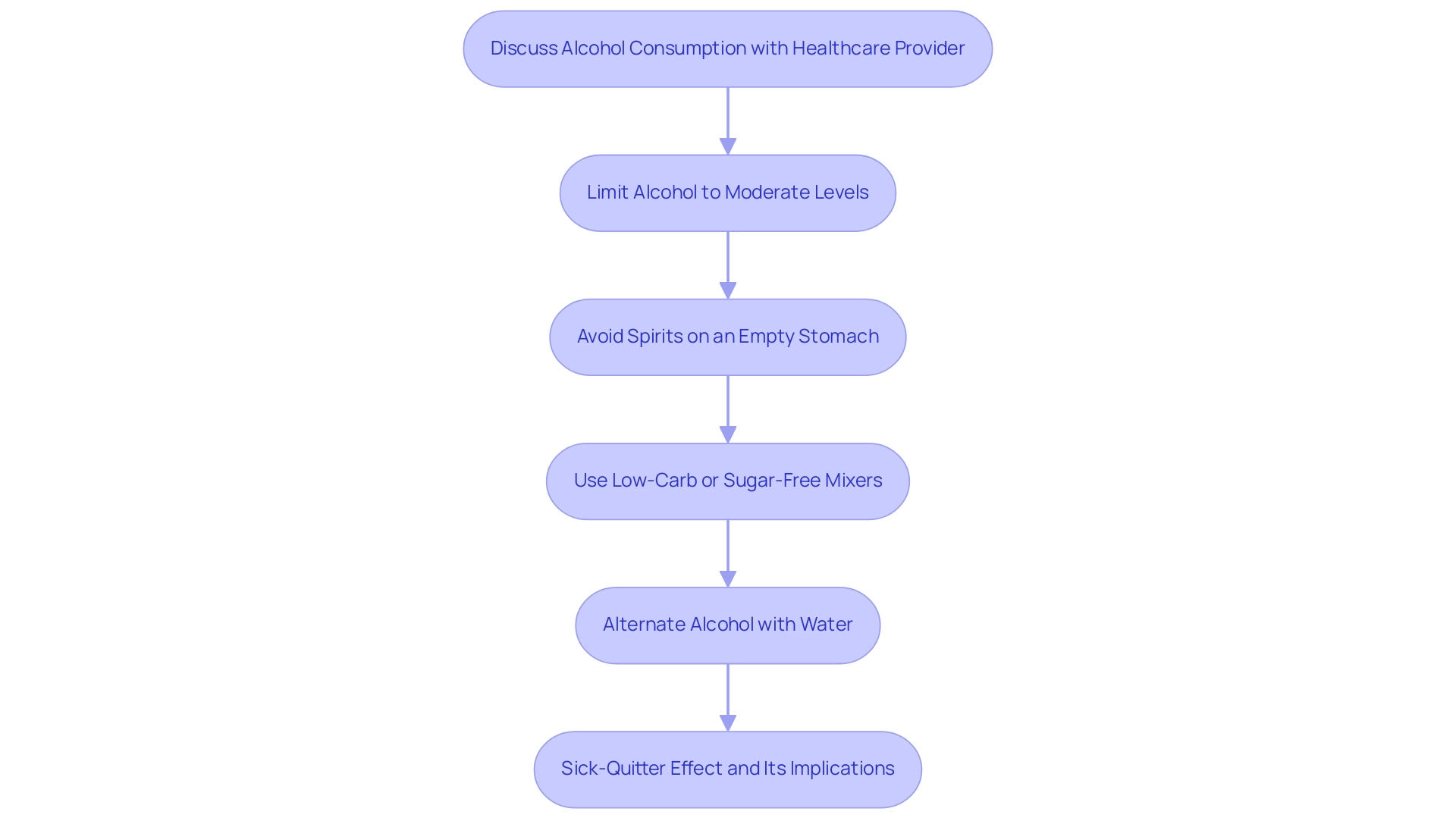
Risks of Alcohol Consumption for Diabetics: What You Need to Know
At T 2 Solutions, we recognize that individuals with diabetes face several significant risks associated with alcohol consumption, which include:
-
Hypoglycemia: Alcohol can lead to dangerously low sugar levels, particularly when consumed on an empty stomach. Symptoms of hypoglycemia may manifest as dizziness, confusion, or even loss of consciousness, highlighting the critical need for awareness in managing glucose levels.
-
Medication Interactions: The intake of spirits can disrupt medications for sugar regulation, leading to erratic changes in glucose levels. It is essential for patients to consult with healthcare professionals regarding any potential interactions to ensure safe management of their condition.
-
Weight Gain: Many alcoholic beverages are high in calories and carbohydrates, which can contribute to unwanted weight gain. This rise in weight can complicate management of the condition and make it more challenging to maintain optimal glucose control.
-
Alcoholic Ketoacidosis: Although rare, excessive alcohol intake can lead to alcoholic ketoacidosis, a serious condition characterized by elevated ketone levels in the blood. This condition highlights the significance of moderation and careful monitoring for individuals with blood sugar issues.
-
Hormonal Effects: Alcohol intake can reduce testosterone levels, which may exacerbate hormonal deficits contributing to impotence in diabetic men. This aspect of the substance's effect is especially significant for male patients handling blood sugar issues.
Recent studies have indicated that high beverage intake raises the risk of blood sugar issues among middle-aged men, whereas moderate intake does not heighten the risk for either gender. Significantly, information collected from 13 Asian groups showed no decrease in risk, differing from results of 25 non-Asian individuals that imply varying dangers linked to drinking. As Dr. Mary Ann Emanuele, M.D., states, "Understanding the multifaceted risks of alcohol consumption with diabetes is essential for individuals managing their blood sugar levels."
At T2DSolutions, we strive to offer extensive resources to assist you in comprehending these risks and support your journey in effective management and maintaining overall health. We invite you to delve deeper into our site and sign up for notifications about new content and resources that can help you in managing your condition.
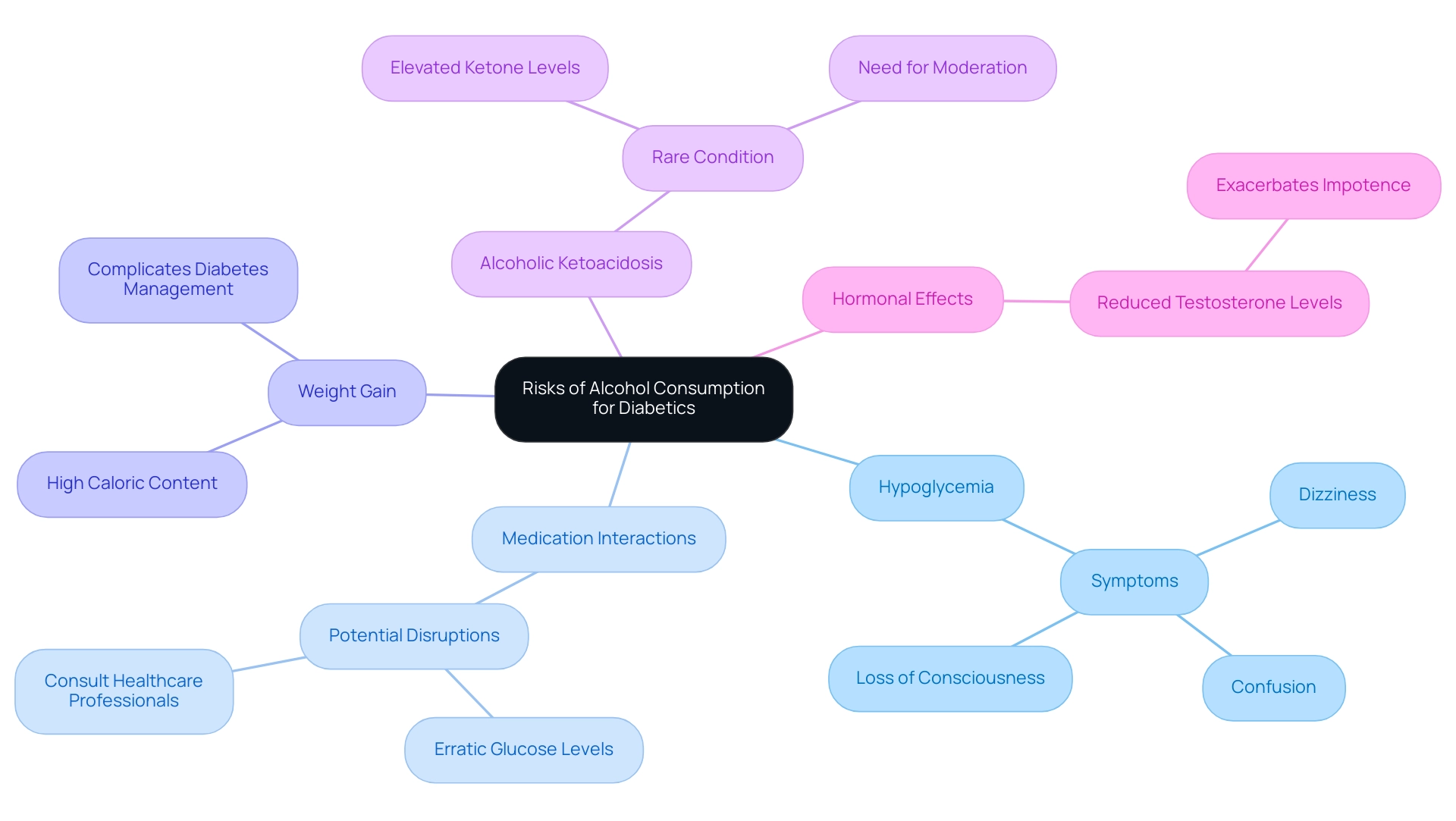
Choosing the Right Alcohol: What Types Are Safer for Diabetics?
- Light Beer: Light beers typically contain fewer carbohydrates than regular beers, making them a preferable option for individuals managing blood sugar levels. T2DSolutions promotes informed decisions regarding alcohol consumption with diabetes to support effective diabetes management.
- Dry Wine: Both red and white dry wines usually have lower sugar content than their sweet alternatives, enabling moderate intake without greatly affecting glucose levels. This aligns with T2DSolutions’ mission to empower patients with knowledge and resources.
- Spirits: Distilled spirits such as vodka, gin, and whiskey contain no carbohydrates when consumed neat. However, it is essential to be cautious with mixers, as many can introduce added sugars. T2Solutions emphasizes the importance of understanding the content of beverages for better management strategies.
- Low-Calorie Cocktails: For those seeking mixed drinks, opting for cocktails made with low-calorie mixers can be beneficial. Avoiding sugary syrups is crucial to prevent unnecessary spikes in glucose levels. T2DSolutions is committed to providing innovative insights for healthier choices.
- Avoid Sweetened Drinks: It is advisable to steer clear of sweet wines, flavored liquors, and sugary cocktails, as these beverages can lead to significant increases in sugar levels. Such choices are particularly important given the recent findings that highlight the increased strength of alcoholic beverages, with some wines exceeding 14% ABV, which also elevates calorie content. Understanding these factors is essential for effective management of the condition.
Experts recommend that the risk of hypoglycemia is a significant concern for individuals with diabetes, especially in relation to alcohol consumption with diabetes, particularly if blood sugar levels are already low. Incorporating findings from a literature search that yielded 1,615 results underscores the extensive research available on this topic. Furthermore, a case study titled 'Causal Role of Beverage Intake in Diabetes' supports the recommendation to limit alcohol consumption with diabetes due to the associated health risks, emphasizing the importance of moderation in beverage consumption. T2DSolutions remains dedicated to empowering diabetes management through education, community support, and holistic care, providing resources such as personalized consultations and community forums to assist newly diagnosed patients.
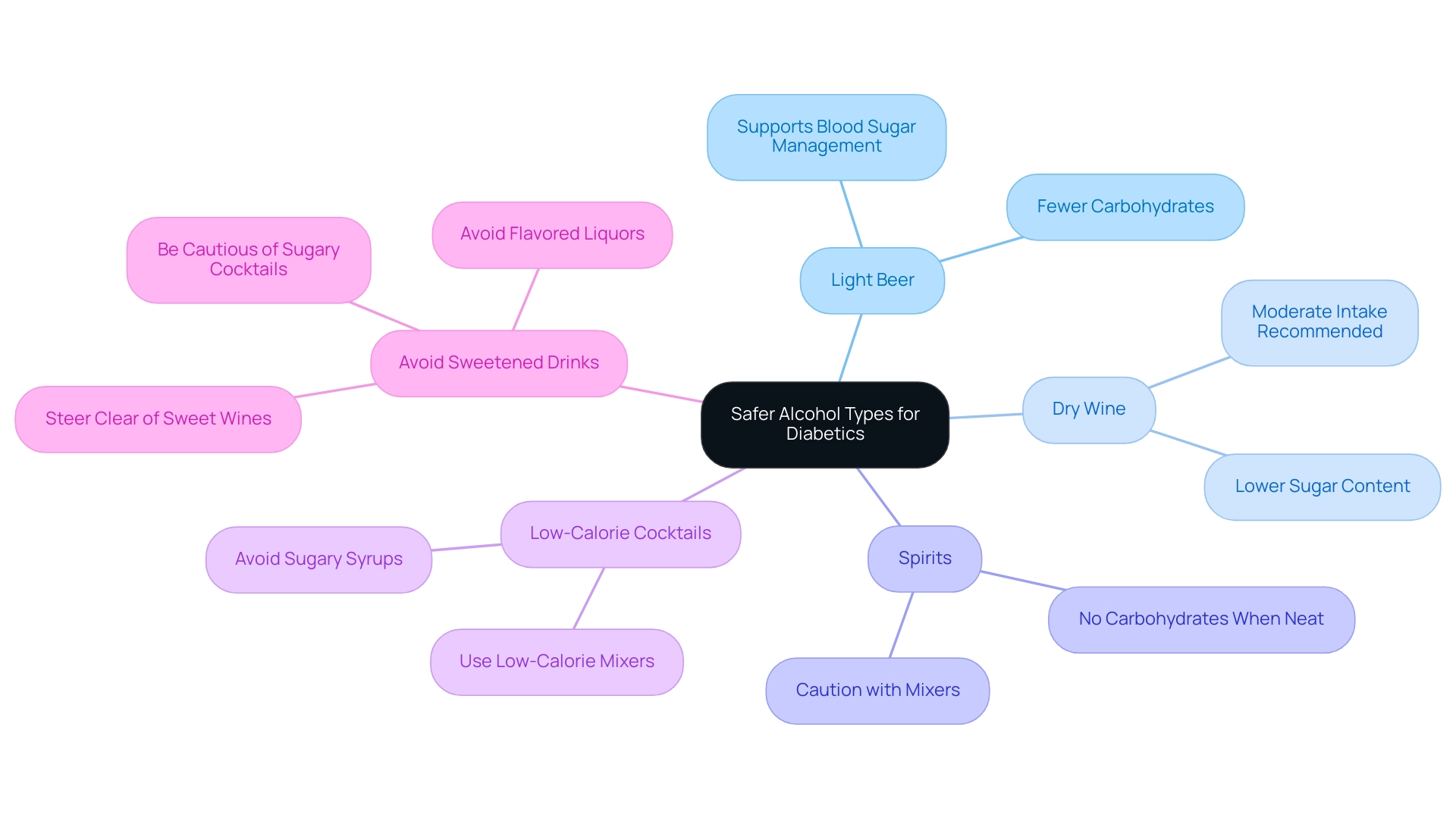
Monitoring Blood Sugar: Essential Practices When Drinking Alcohol with Diabetes
-
Pre-Drink Monitoring: It is essential to check your blood sugar before consuming beverages to establish a baseline level. This initial reading helps to determine how ethanol might affect your glucose levels. According to trends studied from 2002 to 2018, the incidence of youth-onset type 1 and type 2 diabetes is on the rise, emphasizing the need for careful management of alcohol consumption with diabetes during social situations.
-
Frequent Monitoring: During beverage consumption, it is advisable to test your glucose levels every hour. This practice allows you to track any fluctuations that may occur due to the effects of alcohol consumption with diabetes, which can vary significantly from person to person. As Boris Kovatchev, Ph.D., points out, comprehending how various elements affect sugar levels is essential for efficient management of the condition.
-
Post-Drink Monitoring: After finishing your drinks, it is crucial to monitor your blood sugar again. Assessing the reaction of your body after alcohol consumption with diabetes can provide valuable insights into how your diabetes management plan should be adjusted in the future. Importantly, in 2020, among emergency department visits related to hyperglycemic crises, a substantial number of patients were hospitalized, emphasizing the potential dangers when intoxicants are involved.
-
Keep Supplies Handy: Always ensure that you have glucose tablets or snacks readily available. This precaution is vital in case of hypoglycemia, a potential risk when drinks are consumed, as it can mask the symptoms of low blood sugar.
-
Educate Friends: Informing friends or family members about your diabetes management plan is equally important. By educating them on your condition and how they can assist you in an emergency, you create a support system that can help you navigate social situations involving alcohol consumption with diabetes safely.
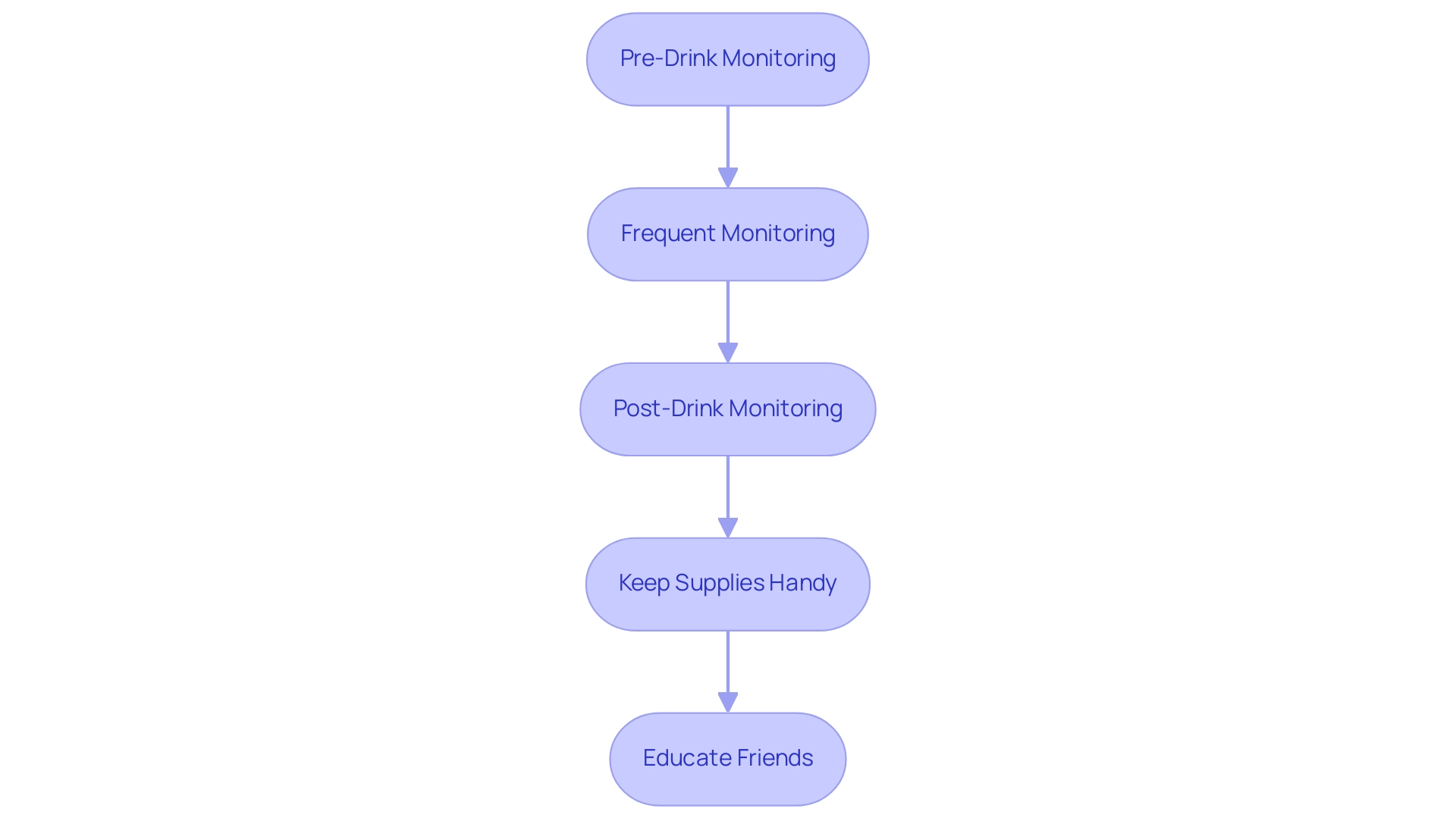
Conclusion
Understanding the intricate relationship between alcohol and diabetes is crucial for effective management of the condition. Alcohol can both elevate blood sugar levels and lead to dangerous hypoglycemia, particularly when consumed without food. This dual effect necessitates a careful approach and close monitoring, especially for those on diabetes medications that may interact with alcohol.
Adhering to safe drinking guidelines can significantly mitigate risks:
- Consulting with healthcare providers
- Limiting intake to moderate levels
- Always consuming alcohol with food
- Choosing lower-carb options
- Staying hydrated
Being aware of the potential for weight gain and other health complications can help individuals make informed choices.
In addition to understanding what types of alcohol may be safer, such as light beers and dry wines, monitoring blood sugar before, during, and after drinking is vital. This proactive approach allows for adjustments to diabetes management plans and helps prevent hypoglycemic events.
Ultimately, individuals managing diabetes can enjoy social occasions while prioritizing their health by following these guidelines and remaining vigilant. With the right knowledge and strategies, it is possible to navigate the complexities of alcohol consumption safely and responsibly.



